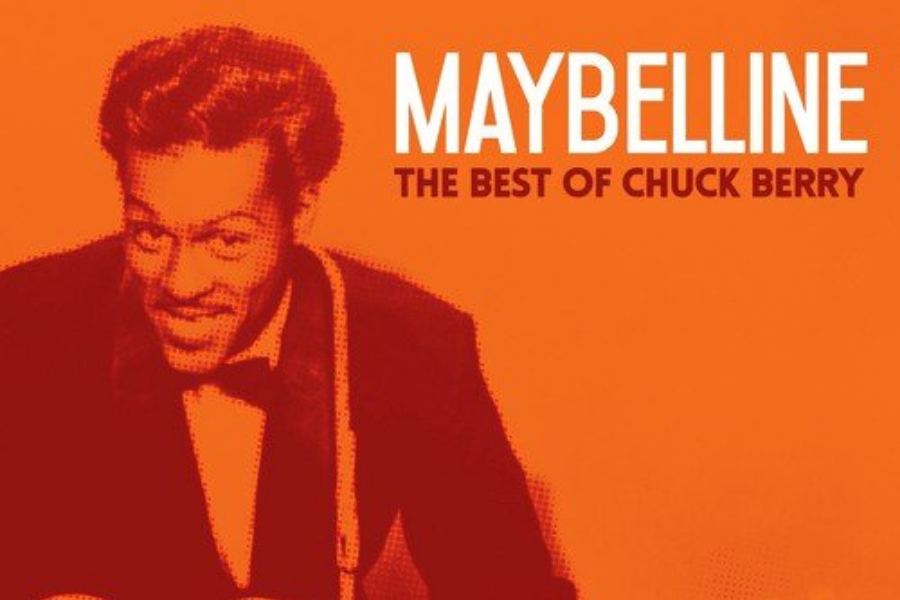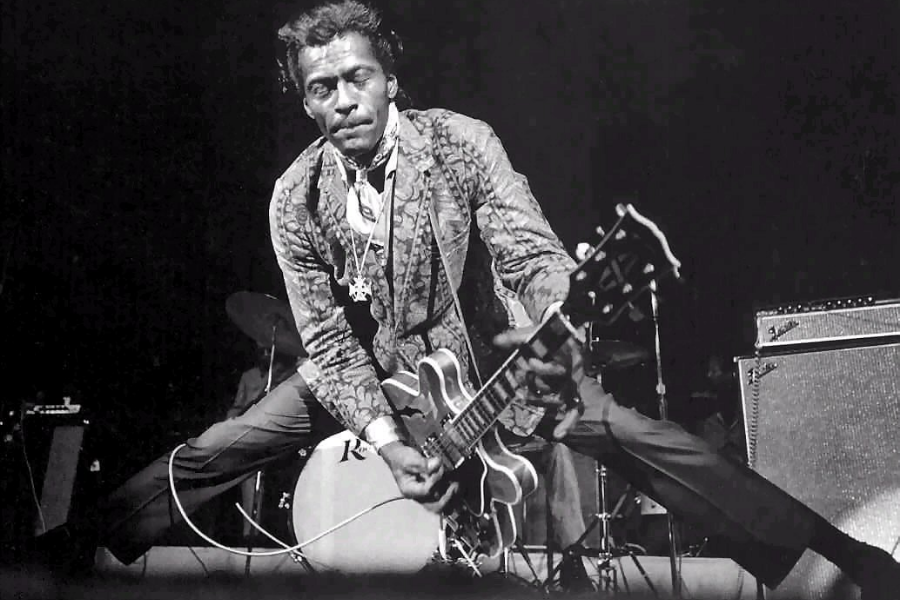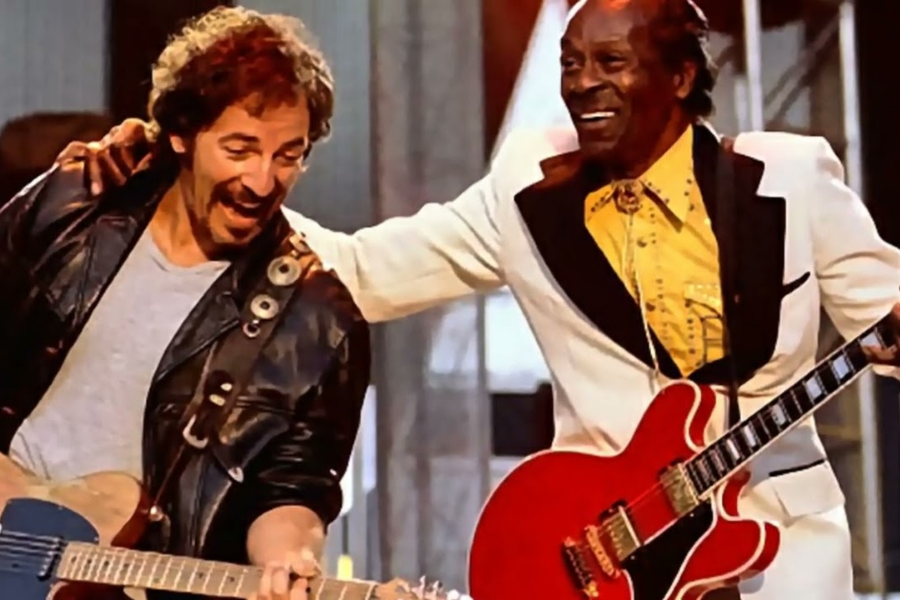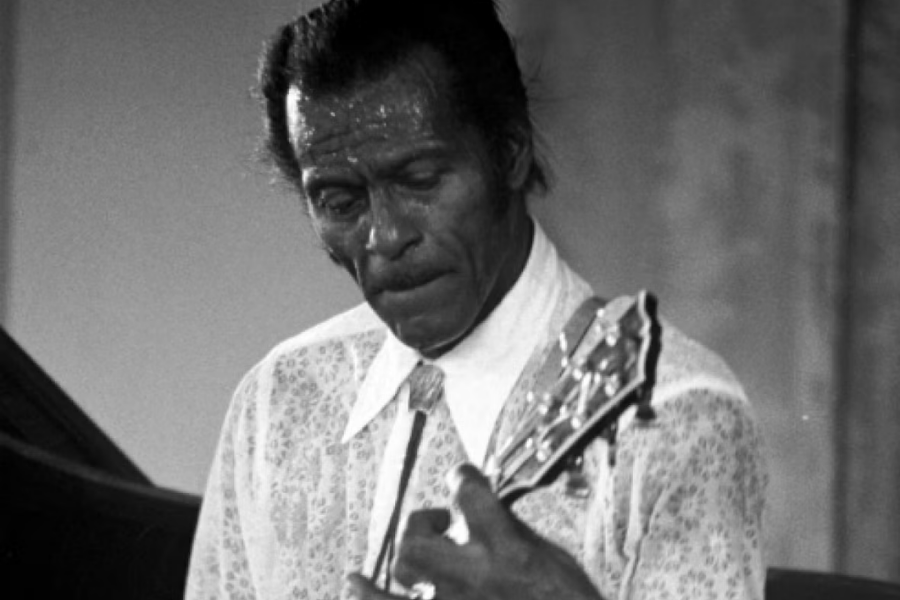There was no doubt that Chuck Berry was the greatest rock and roll songwriter. Berry made some of the most famous and groundbreaking songs that defined the spirit and attitude of the music with his unique mix of rhythm and blues, country, and clever social criticism. His guitar playing was just as important; riffs and leads that have been played by artists of all styles for generations. Berry pretty much created rock music as we know it, so it’s impossible to overstate how important he was.
In this blog, Eguitarmania will talk about some of Chuck Berry’s greatest hits songs. You’ll learn the interesting stories behind the songs’ ideas and inspirations, such as how they capture the spirit of a young musician-to-be. From capturing the spirit of an aspiring musician to cheekily ushering out the classical era for a new age of rock and roll.
Maybellene (1955) : Chuck Berry’s Greatest Hits Songs
Berry released the song “Maybellene” for Chess Records in 1955. He was a young man from St. Louis at the time. It took Chuck Berry and his band 36 failed attempts to make the best version of “Maybellene” and record it.

Leonard Chess liked how confident the young man was, so he told Chuck Berry to bring back a tape of his own music. The title was Chuck’s idea, which came from seeing a Maybelline mascara box on the floor at the chess studio.
Blends Country With Rhythm And Blues
This is where it all began. Not only was “Maybellene” Berry’s first hit, but it was also one of the first real rock and roll songs. This song, like many others like it, is the messed-up child of country and R&B. The music was taken from “Ida Red,” a 1938 Western swing song by Bob Will and His Texas Playboys. Berry changed it a lot by adding his own unique rhythm and blues touches to it.
“Maybellene” quickly became No. 1 on the R&B charts thanks to its steady moving beat. After two weeks, in August 1955, it got to No. 5 on the very important pop list.
How did a song about a car and a broken heart revolutionize music charts?
Berry had even started writing his own songs, and they had cool white country music features like cars and young love. The song is basically a two-minute drive scene full of Berry’s own trendy slang and phrases used in the car culture.
He made a lot of classic rock and roll in just two minutes and thirteen seconds, like the loud guitar cadenza at the beginning, the vamping vocal rhythm in the lyrics, and the wild solo at the end that every ax player who came after Berry has copied.
Besides writing the music, Chuck Berry was the first artist who really did everything. He directed the stage show and wrote the songs. That wasn’t done by anyone.
Johnny B. Goode (1955)
Berry made a good choice, even though it must have been hard to bring out the spirit of pop music in just one track. When “Johnny B. Goode” came out in March 1958, it was one of Berry’s many hits that helped shape the sound and themes of rock music.

Berry’s song “Johnny B. Goode” had made it to number two on the R&B charts and number eight on the pop charts in the US.
Who Was Johnny B. Goode, Really?
Berry talked about the message of the song by saying that he was a “country boy” who grew up in a small town in the Deep South.
One way to look at it is that Johnny B. Goode is just a made-up version of Chuck. That would mean ignoring the fact that Jonnie Johnson was there. Johnson was a piano player who played on some of Berry’s biggest hits and whose name the main character of this song gets its name.
True enough, Berry spent her formative years on Goode street in the vibrant and multicultural Mid-Western metropolis of St. Louis.
Why Did This Song Become An Icon For Aspiring Musicians?
This must be why some of rock’s most famous acts have played it so often: Many artists, including Elvis Presley, Jerry Lee Lewis, Cliff Richard, The Beatles, Jimi Hendrix, The Beach Boys, Sex Pistols, The Grateful Dead, The Carpenters, and many more, have used Berry’s song about himself as a mantra. They may not be good at reading or writing, but they can play the guitar like it’s a bell!
It seems like “Johnny B. Goode” is a shiny artifact from a time when society changed amazingly quickly. This tiny black 45-rpm disc has catchy lines that you can sing along with and a fiery guitar. Johnny B. Goode is the second successful rock and roll album in a year. This tiny black 45-rpm disc has catchy lines that you can sing along with and a fiery guitar.
Roll Over Beethoven (1956)
Charlie Berry told Rolling Stone, “I wanted to play the blues.” “But I wasn’t blue enough. We always had food on the table.” When Berry first composed this guitar songs, he was making a loving poke at his sister Lucy, who got the family piano and left little Chuck with little opportunity to play. However, “Roll Over Beethoven” became the most famous rock and roll rising star, announcing a new era. Berry revealed the change of musical guard with a smoking guitar riff and Johnnie Johnson’s pounding piano.

After “Maybellene” did well, Berry unleashed one of the funniest and bravest pop slurs ever: “Roll over Beethoven, the news.” This song was trying to say that old ideas about “classical music” have been replaced by a new sound.
Even though Berry called it “rhythm and blues” in the words, everyone can tell he’s playing stone-cold rock & roll because of the way his opening guitar jam is so powerful. The chaos, skill, and inevitable fame of it make it something to remember. Berry didn’t just make rock and roll better with this song’s attitude; he kind of made punk first.
Cultural impact of “Roll Over Beethoven”
“Roll Over Beethoven” seems to be a motto for rock and roll music, which was popular across the country in 1956, the year the song came out. But, like a lot of Berry songs, the words are about a lot more than just enjoying being a teenager.
The first line, “Gonna write a little letter, gonna mail it to my local DJ,” is a tribute to the many DJs across the country who have helped rock and roll evolve. It’s more likely that Chuck had one DJ in mind, Alan Freed.
Freed made rock and roll popular by playing black rhythm and blues on his Moondog radio show on WJW in Cleveland in the early 1950s. More and more white people were listening, and the show became a hit.
And Freed helped Berry’s career get off the ground in August 1955 by playing “Maybellene” on the New York radio station WINS. The song became a huge national hit, and Berry became famous almost overnight.
The generational shift in musical preferences
One line, “Roll over Beethoven,” is repeated in each verse, it’s interesting that the song doesn’t have a chorus. It’s clear what it means: the hedonism and joy of rock and roll music are taking over from the old order, which is represented by classical artists and their complex orchestral works.
But Berry wrote in his book in 1986 that the lines were also a joke at his musically trained sisters, mezzo-soprano Lucy and pianist Thelma, who would often kick their younger brother off the family piano so they could pursue their own musical goals.

No matter who was on the band, Chess Records recorded “Roll Over Beethoven” in April of that year and put it out a month later. However, it would be another month before the song made it to the “Billboard” Hot 100. By “Billboard” standards, the song was a minor hit. It debuted at number 29 on June 30 and stayed there for only four more weeks.
Final Thought
It’s impossible to say enough about how important Chuck Berry was to the development of rock and roll. The way he mixed rhythm and blues and country in songs like “Maybellene,” “Johnny B. Goode,” and “Roll Over Beethoven” was so fresh.
His songs, like the “Maybellene” character who is always hot-rodding and the “Johnny B. Goode” character who wants to be a guitar hero, turned youth life into modern myths.
Many years later, every note and word of Berry’s old songs still makes you feel happy and free. His music is one of the most important things in rock and roll history.









